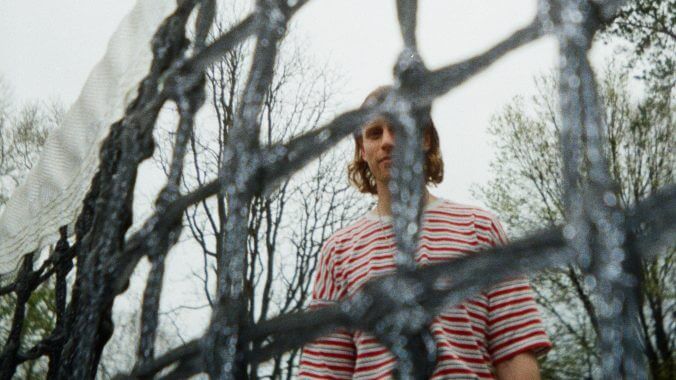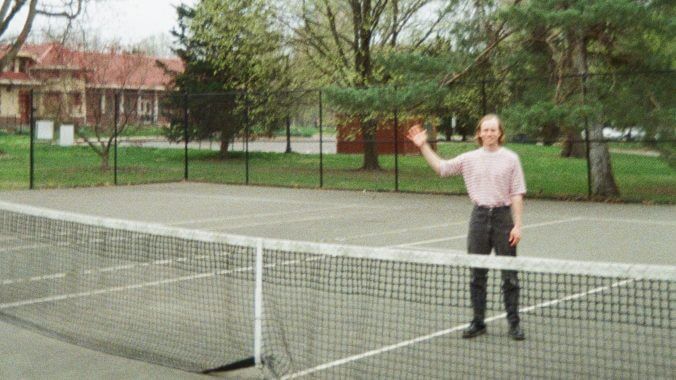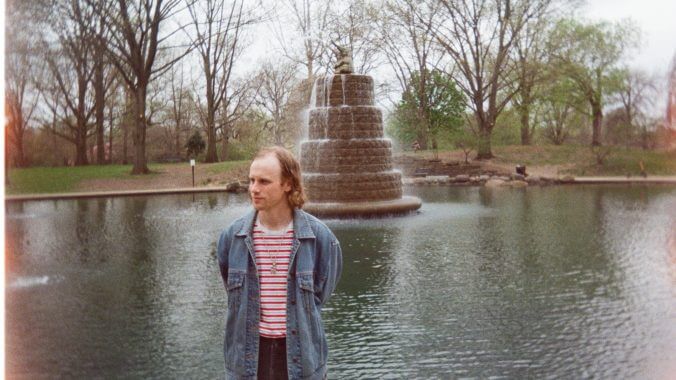Through the Ashes of the Sidekicks Arises superviolet, Steve Ciolek’s Greatest Turn Yet
Photos by Matt Mitchell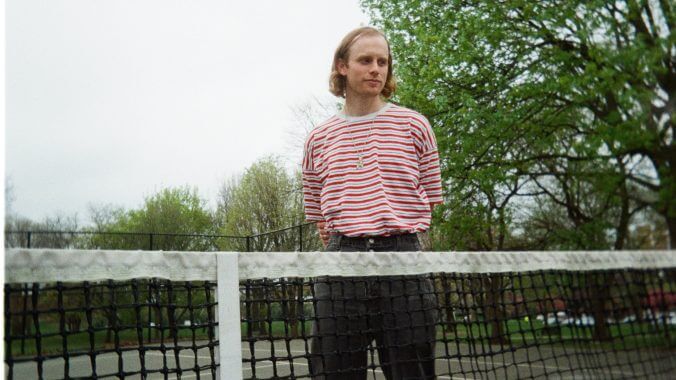
Steve Ciolek has seen America many times over, but he’s content with staying in Ohio for as long as the state will hold both him and his buds. When he was fronting the Sidekicks—the Buckeye State’s beloved coterie of emo, power-pop sharks—hubs like Chicago, Brooklyn and Philadelphia were always destinations, but never fantasies of a possible forever. Touring for over a decade and visiting every city scratched that itch, and he and the band were more than comfortable coming from a place where rent was dirt cheap and the DIY scenes were plentiful. It was a financial saving grace that allowed the Sidekicks to record and practice infinitely and play with the bands they felt drawn to, not the bands that could snag them big paydays on the road; playing house shows and dives across Northeast and Middle Ohio put them in the same company as local legends, like Runaway Brother, Ulysses and Meridian.
Now, Ciolek is a graduate student studying physiotherapy at Ohio State University, with the hopes of possibly becoming a physical therapist down the road. It’s an occupation that runs in his family, and it makes sense that the guy who has spent almost two decades chronicling pain through existentialism and young heartbreak can also deduce the source of someone’s bodily pain on a dime. In his spare time away from school, Ciolek walks the streets of Victorian Village with his wife Kosoma and sings Coldplay songs with her, digs for soul vinyls at Used Kids Records on Summit Avenue, has grown to not be all that impressed with the local grub on nearby High Street and volunteers with golfers impacted by chronic pain. Oh, and he’s also about to put out his debut solo record, Infinite Spring, under the moniker superviolet.
In the wake of COVID-19 and remote work, I rarely get to do an interview with someone in-person. Being that Ciolek and I live in the same place—beautiful Columbus—it felt like a no-brainer to do something in the city that spawned Infinite Spring. So, we meet up with each other at Goodale Park, a 172-year-old oasis in the heart of Victorian Village. It’s also where Ciolek landed his first-ever kickflip. The week leading up to our conversation, Columbus had opened up. Without a hitch, the cold-trodden weather tumbled into a string of 75-degree days. To be from Ohio is to understand—and believe in—the mythological spirit of a “fool’s spring,” where the onslaught of snow suddenly snaps into uncomfortable warmth, and all of us are sure—convinced—that spring and summer are here to stay. But then it leaves us just as quick as it came. Ciolek buys into all of that, too, and it’s a big reason why the new album is called Infinite Spring.
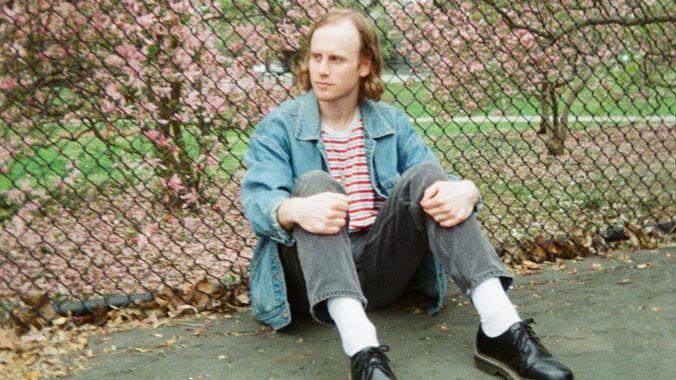
Ciolek’s work has always been in a close proximity to warm weather. On Twitter last week, an account I follow—but have no recollection of ever consciously following—posted a screenshot of the Sidekicks song “Twin’s Twist” and proclaimed that spring in the Midwest doesn’t start until that track is on repeat. Ciolek’s former band’s reach remains infinite, because albums like Runners in Nerved World and Happiness Hours were emblematic of being young, in love and mesmerized by the summer solstice’s immeasurable and beautiful tempest.
“For me, it was always like, in the winter, you think you would get all of this work done and you think that’s the time when artists are able to be very productive—because there’s not as much social things going on,” he says. “But, it’s hard, because [the winter] affects you in such a way. Then you have that amazing one day in Ohio, and it’s almost like your New Year’s resolutions really start then. You’re like, ‘I’m gonna do this. I can do all of these things.’ For as long as I can remember, the majority of the songs I’d write would be around the spring, for that reason.”
The line of where the Sidekicks ended and superviolet began is rather blurred. A handful of the songs that are on Infinite Spring were written while the Sidekicks were still touring together, and the album even makes a nod to the band in the lead single, “Overrater”: “So call Felicia, call up Matt / Tell them to craft the plan / Surprise release sixth album as / The greatest rock ’n’ roll band.” But longtime fans of Ciolek’s work were quick to read a little too far into those lines. “There were some people online who took that as ‘Maybe there’s a Sidekicks album that’s going to come out, that the line was like an Easter egg,’ and I was like, ‘No, that just would have been a Sidekicks song. It was a self-referential thing,’” he says.
The official announcement of the band’s dissolution came in December 2022, but the decision to call it a day dates back as far as early 2020. The reason for the delay in telling everyone about it got canned when the pandemic hit, and, after a few people kept checking in with them, they took to the internet to make it official by way of a photo of some of their merch throughout the years. Though Ciolek and Matt Climer had formed the Sidekicks in high school, playing Rancid covers and doing house shows on weekends, it was never going to be a forever thing. Yet, ex-Ohio emos who are now dads and work in offices and stick to the outer banks of mosh pits couldn’t help but feel like a part of them had fallen away.
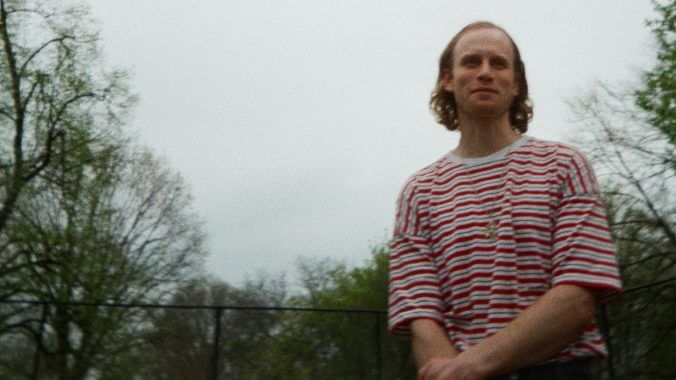
But, the “breakup,” if you can even call it that, wasn’t some grand exit for the band. The Sidekicks’ quota for success had been met, and everyone in it didn’t see the benefits of taking more from the project than what it could give. Members came and went, they put out five great LPs and, until the very end, the name—and Ciolek’s songwriting—endured, against all odds. “It almost felt insane that it was still the same name and still the same band after all those years,” he adds. “We did everything that we ever wanted to do with that band and more. It was an amicable thing where it just felt like a good time to just call it, move on and do different things.”
Despite fronting the Sidekicks for 15 years, Infinite Spring is Ciolek’s greatest gift to all of us. It’s been a long while since there’s been a more thoughtful, golden and clever rock ’n’ roll record. The cherry on top? It’s got the blood and hope of Ohio roaring through its veins. Ciolek’s best pal and longtime collaborator Zac Little—the frontman of fellow-Buckeye folk-rock legends Saintseneca—played bass, theremin, wind harp, solo freak and “digital goober” on the album, while his Sidekicks co-CEO Climer took to the drums, shaker and tambourine. Ciolek’s wife Kosoma Jensen provided harmonies and clarinet, and her cat Fry—which Ciolek has become the father of by adoptive proxy—meows and chews on “Good Ghost.”
-

-

-

-

-

-

-

-

-

-

-

-

-

-

-

-

-

-

-

-

-

-

-

-

-

-

-

-

-

-

-

-

-

-

-

-

-

-

-

-

